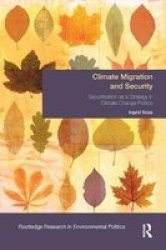Description
Climate migration, as an image of people moving due to sea-level rise and increased drought, has been presented as one of the main security risks of global warming. The rationale is that climate change will cause mass movements of climate refugees, causing tensions and even violent conflict. Through the lens of climate change politics and securitisation theory, Ingrid Boas examines how and why climate migration has been presented in terms of security and reviews the political consequences of such framing exercises. This study is done through a macro-micro analysis and concentrates on the period of the early 2000s until the end of September 2014. The macro-level analysis provides an overview of the coalitions of states that favour or oppose security framings on climate migration. It shows how European states and the Small Island States have been key actors to present climate migration as a matter of security, while the emerging developing countries have actively opposed such a framing. The book argues that much of the division between these states alliances can be traced back to climate change politics. As a next step, the book delves into UK-India interactions to provide an in-depth analysis of these security framings and their connection with climate change politics. This micro-level analysis demonstrates how the UK has strategically used security framings on climate migration to persuade India to commit to binding targets to reduce their greenhouse gas emissions. The book examines how and why such a strategy has emerged, and most importantly, to what extent it has been successful. Climate Migration and Security is the first book of its kind to examine the strategic usage of security arguments on climate migration as a political tool in climate change politics. Original theoretical, empirical, and policy-related insights will provide students, scholars, and policy makers with the necessary tools to review the effectiveness of these framing strategies for the purpose of climate change diplomacy and delve into the wider implications of these framing strategies for the governance of climate change. Review: Few in Europe doubt that climate change represents a significant global challenge. But less obvious is the extent to which climate change has become both a subject and tool of global diplomacy in recent years. In this excellent and well-researched book, Ingrid Boas sheds light on how small island and European states - notably the UK - have constructed climate change as a security threat, and their unsuccessful efforts to persuade major emerging developing countries - notably India - that this threat is significant. Her analysis tells us much about the misunderstandings and mistrust that beset international diplomacy in the 21st century. -Professor Richard Black, SOAS, University of London Threats of 'climate wars' and floods of 'climate refugees' have been central in the climate-change discourse for years, especially in the richer countries in the North. But does such 'securitisation' of climate policy really help? Who pushes discourses of 'environmental security', and who benefits? Ingrid Boas' outstanding analysis reveals in great detail the complex politics around recent attempts at a 'securitisation' of climate politics. Her book is a must-read for scholars as well as policy-makers in this field, who will find in this remarkable study an important insight: 'Scare stories' are not the best means to convince an already skeptical audience. -Frank Biermann, VU University Amsterdam and Lund University
